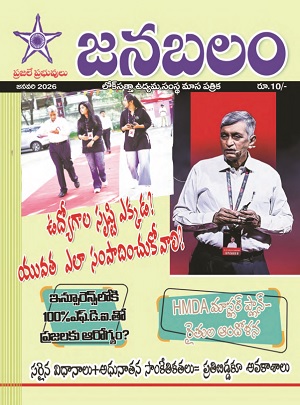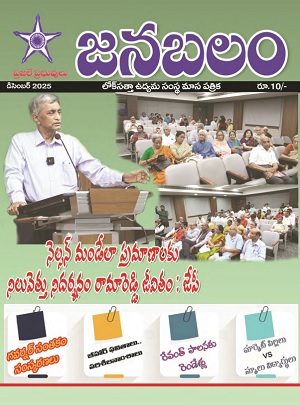Lok Satta Party President Dr. Jayaprakash Narayan today welcomed the TDP proposal to provide universal health care and education, if elected to power. Commenting on the TDP election manifesto, Dr. JP said, "We are happy health care and education are becoming the central issues of the 2009 elections as prophesied by the Lok Satta."
Addressing a media conference, Dr. JP recalled that the Lok Satta Party in its manifesto released as early as in July 2008 gave 50 irrevocable guarantees including provision of universal health care and education, job skills and employment opportunities and social security for the poor and the unorganized. "The Lok Satta program, patterned on the lines of the National Health Service in Britain, provides for association of both the public and private sectors, competition among health care providers and choice to patients".
"We don't have details of the TDP program but we are happy that they are following our lead in providing universal health care covering the entire spectrum of diseases instead of limiting it to a few diseases for costly, tertiary care under Arogyasri."
Dr. JP termed the TDP promise to distribute color TVs as "irresponsible and unconstitutional" and its cash transfer scheme to the poor and middle classes as "an invitation to disaster." Recalling that the DMK in Tamil Nadu and the Congress in Karnataka had promised color TVs to the poor on the eve of elections there, Dr. JP said the Lok Satta had complained to the Election Commission against the corrupt election practice. "If it is legitimate, nothing prevents a political party from promising five liquor bottles a month to , or a gold biscuit to every family.
Dr. JP said it was possible to argue that some subsidies like those on food, fertilizer and petroleum products, however irrational or unsustainable, were legitimate tools to alleviate poverty and fulfill their constitutional mandate by elected representatives. But color TV distribution was nothing but a cheap gimmick and did not form part of a legislator's mandate.
Dr. JP appealed to the media, the intellectuals and the public in general to nip the "totally reprehensible" proposal in the bud.
On the TDP's cash transfer scheme, Dr. JP said the Lok Satta was the first party in the country to propose a fair and affordable social security scheme and included it in its 50 irrevocable guarantees. He pointed that many Western societies had come to grief by institutionalizing open-ended and unlimited social security coverage. While such schemes might be extremely popular in the short term, they would prove to be highly detrimental to our children's future in the long term. "As a society ages, the dwindling working population will have to pay for the growing non-working population."
Dr. JP said that the TDP scheme could cost as much as Rs.25,000 crore assuming that a majority of the 1.25 crore beneficiary families would lay claim to a cash transfer of Rs.2000. He pointed out how the number of white card holders had swelled to more than two crore grossly exceeding the total number of families in the State.
Dr. JP added: "Nowhere else in the world is there such a scheme which divides society into two groups -- the tax payers and those dependent on the Government for the dole. The scheme that encourages perpetual dependence on the Government at enormous cost to the exchequer is nothing but an invitation to disaster."
Dr. JP said that the Lok Satta Party had, in contrast, proposed a social security scheme based on contribution. "The Lok Satta scheme imposes a finite burden on the exchequer since it envisages a cap on the time it is operational and the money that is distributed. At the end of five or seven years, a contributory family is assured of Rs.1,00,000 so that it can meet its pressing needs."
"Poverty can be eradicated only by the four mantras of quality education to every child, good healthcare to every family, skills and productive jobs to every young person, and enhanced incomes in agricultrue and traditional occupations. There is no other Alladin's lamp, Dr. JP asserted.
Impossible promise:
Dr. JP welcomed the Praja Rajyam Party borrowing the Lok Satta idea of forming district governments, whatever be its intentions.
He, however, termed the Praja Rajyam plan to distribute two acres and a half of wetland or five acres of dry land to every poor family cannot be implemented. The total geographical area of the State is six crore acres and of it excluding hilly and forest regions, the land available is just three crore acres. Assuming that there are about 70-80 lakh landless families, the land to be acquired for distribution will be about three crore acres – an impossible task.
On the Praja Rajyam proposal to appoint an inquiry commission with a sitting judge to go into corruption cases against politicians, Dr. JP said that a commission, which takes ages to pronounce its verdict, will merely facilitate the burial of the issue, and not prosecution of the guilty. A solution lies in constitution of special courts and appointment of special public prosecutors by the High Court. A law should be passed for the confiscation of the properties of the guilty.
Thursday, March 5, 2009
Colour TVs for Votes are Unconstitutional. TDP's cash transfer scheme is an Invitation to disaster: Dr. JP
Labels:
loksatta
Subscribe to:
Post Comments (Atom)





great plan for great future of AP
ReplyDelete